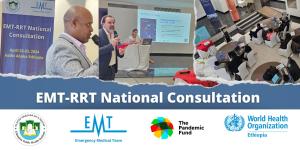Integration of Public Health Rapid Response Teams (RRTs) and Emergency Medical Teams (EMTs) for Effective Health Emergency Response
In the face of global health emergencies, timely and effective response measures are critical for saving lives and mitigating the impact of crises. A significant step towards achieving this goal occurred during a consultation meeting including WHO, the Ethiopian Public Health Institute (EPHI) and other partners on April 21st and 22nd, 2024, in Addis Ababa. Experts from both RRTs and EMTs convened to explore the possibility of integrating these programs at the national and sub-national levels.
During the two-day consultative meeting, participants delved into the advantages of creating a unified approach enhance public health responses. Through a thorough examination of each program's tasks, experts assessed the potential for full or partial integration and the capacity to execute tasks jointly. The meeting culminated in the identification of priority tasks for integration and the drafting of benchmarks to measure successful implementation.
The lively discussions during the consultation underscored a shift in perception towards the integration of RRTs and EMTs, with participants expressing a newfound understanding of its benefits. As a result, there was a consensus to continue working towards integration and to extend this experience to regions in Ethiopia where RRT activities are prevalent.
Mr Medhanye Habtetsion, Director, Public Health Emergency Response and Recovery Directorate at the Ethiopian Public Health Institute (EPHI) states that "After recognizing inefficiencies in managing Emergency Medical Teams (EMTs) and Rapid Response Teams (RRTs) separately, the concept of integration emerged to streamline operations and improve overall response effectiveness."
Emergency health responses start at the local level, highlighting the importance of investing in national and local capacities. RRTs and EMTs are a critical component of the health emergency workforce and play vital roles in deploying multidisciplinary teams to respond swiftly and effectively to public health emergencies. While international surge support organizations have their place, developing national RRTs and EMTs is prioritized to ensure a contextually appropriate, community-centered, and timely response.
A global scoping project conducted by WHO and the US-CDC highlighted the potential benefits of integrating RRTs and EMTs. Despite being managed separately, both programs share similar functional elements throughout the emergency response cycle. Integration aims to synchronize functions at the local and national levels, maximizing resources and expertise.
Several countries are already integrating their RRT and EMT programs, signaling a growing trend towards collaboration. However, there's a need for standardized definitions and a global understanding of the scope and role of RRTs and EMTs. Despite challenges, such as varying administrative structures, there's a consensus on the benefits of integration, particularly in leadership and sustainable financing.
A global consultation held by WHO emphasized the importance of exploring integration to enhance effectiveness, efficiency, and sustainability. Discussions highlighted the feasibility of integration and identified priority tasks that could be jointly executed by RRTs and EMTs. Achievements include the development of recommendations, frameworks, and benchmarks for successful integration.
The integration of RRTs and EMTs presents a promising strategy for strengthening rapid response capacities and the health emergency workforce in emergency health situations. By leveraging synergies and sharing resources, countries can enhance their ability to respond effectively to current and future public health threats. Continued collaboration and investment in integration efforts are crucial for building resilient health systems globally.
